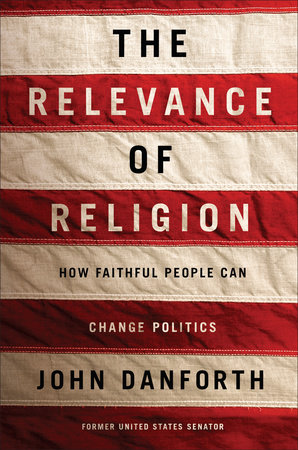Next month, Penguin Random House will release “The Relevance of Religion: How Faithful People Can Change Politics” by John Danforth (former attorney general of Missouri, United States senator from Missouri, and United States representative to the United Nations). The publisher’s description follows:
Former United States senator and ambassador to the United Nations John 
In an era of extreme partisanship, when running for office has become a zero-sum game in which candidates play exclusively to their ideological bases, Americans on both sides of the political aisle hunger for the return of a commitment to the common good. Too often, it seems, religion has been used as a wedge to divide us in these battles. But is it also the key to restoring our civic virtue?
For more than a decade, John Danforth, who is also an ordained Episcopal priest, has written extensively on the negative use of religion as a divisive force in American politics. Now he turns to the positive, constructive impact faithful religious believers have and can have on our public life. The Relevance of Religion is the product of that period of reflection.
In the calm and wise voice of the pastor he once aspired to be, Senator Danforth argues that our shared religious values can lead us out of the embittered, entrenched state of politics today. A lifelong Republican, he calls his own party to task for its part in Read more
 anti-heretical repression in the first half of the fourteenth century, focusing on the figure of Jacques Fournier/Benedict XII (c.1284-1342). Throughout his career as a bishop-inquisitor in Languedoc, theologian, and, eventually, pope at Avignon, Fournier made a multi-faceted contribution to the fight against religious dissent. Making use of judicial, theological, and diplomatic sources, the book sheds light on the multiplicity of methods, discourses, and textual practices mobilized to define the bounds of heresy at the end of the Middle Ages. The integration of these commonly unrelated areas of evidence reveals the intellectual and political pressures that inflected the repression of heretics and dissidents in the peculiar context of the Avignon papacy.
anti-heretical repression in the first half of the fourteenth century, focusing on the figure of Jacques Fournier/Benedict XII (c.1284-1342). Throughout his career as a bishop-inquisitor in Languedoc, theologian, and, eventually, pope at Avignon, Fournier made a multi-faceted contribution to the fight against religious dissent. Making use of judicial, theological, and diplomatic sources, the book sheds light on the multiplicity of methods, discourses, and textual practices mobilized to define the bounds of heresy at the end of the Middle Ages. The integration of these commonly unrelated areas of evidence reveals the intellectual and political pressures that inflected the repression of heretics and dissidents in the peculiar context of the Avignon papacy.